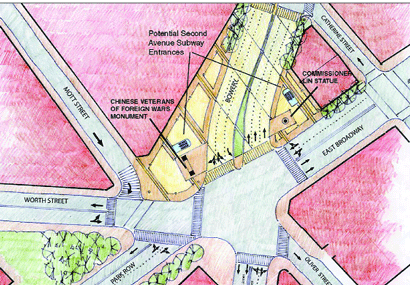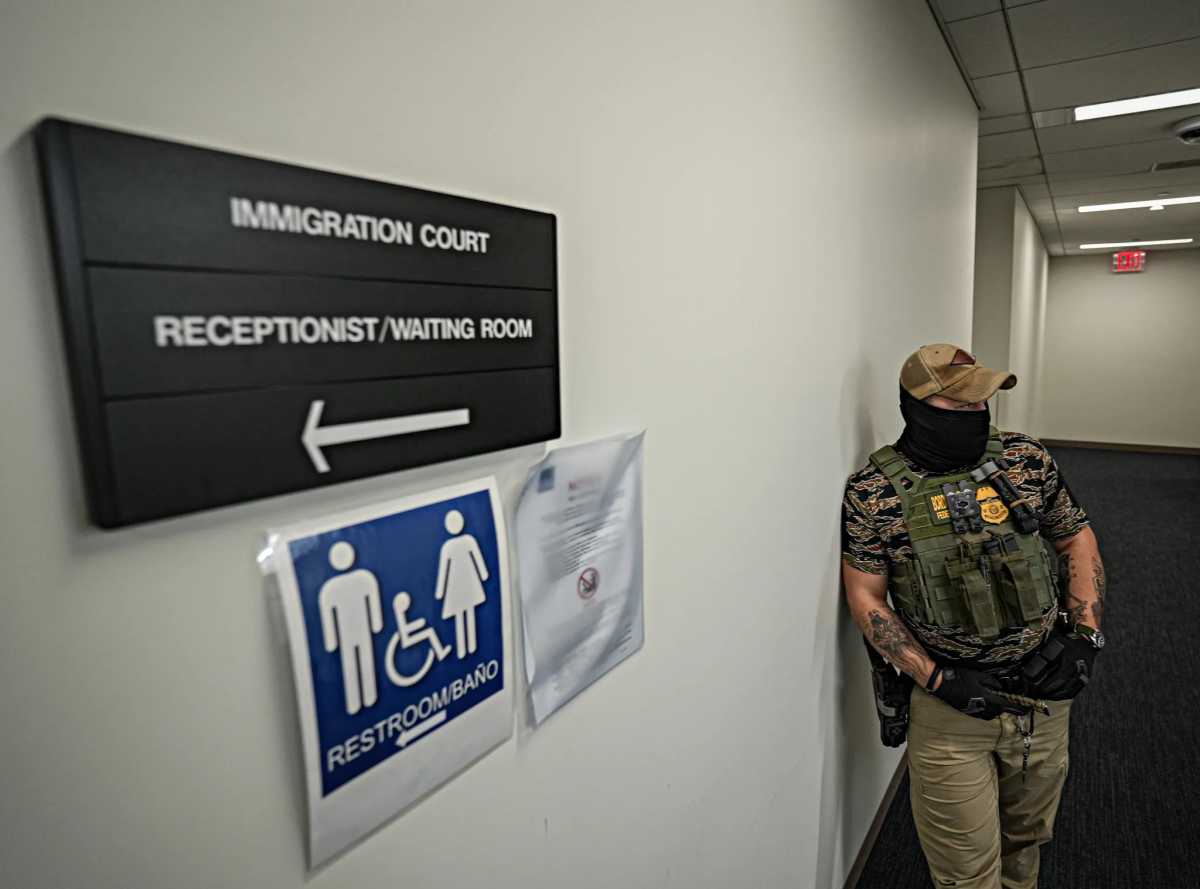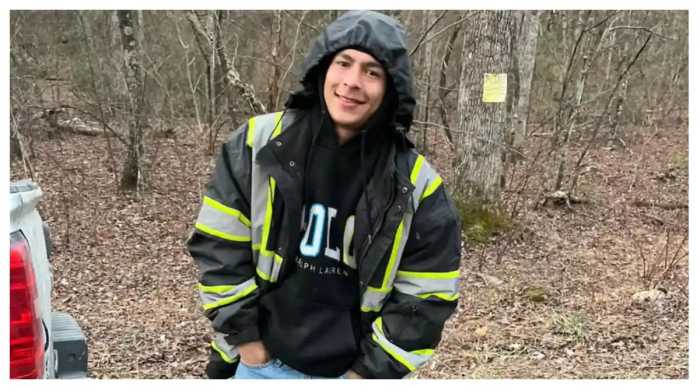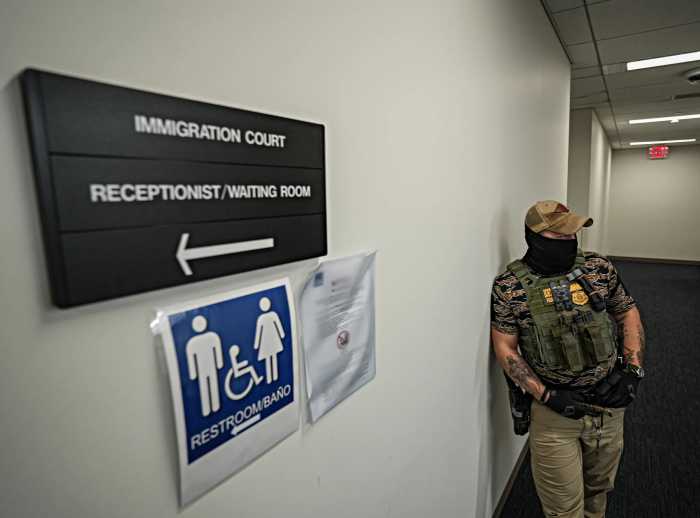By Josh Rogers
Some in Chinatown are hoping they may be turning a corner on the traffic and congestion problems that have plagued the neighborhood for decades — now that the Lower Manhattan Development Corporation has released a new study endorsing many of the solutions long favored by residents of Chinatown and the Lower East Side.
The report, which was released earlier in December, recommends changing traffic patterns around Chatham Square and building a nearby plaza on Park Row, adding a crosstown bus route most likely along Grand and Broome Sts., creating areas for tour buses and commuter vans to park, widening some sidewalks, and building an underground parking garage near the courts at Collect Pond, where there’s a public plaza and parking lot.
There are not yet any public cost estimates for the plan but officials think improvements to the Chatham Sq. area can be done for something close to $10 million and a bus drop-off area on Forsyth St. would cost about $5 million. Councilmember Alan Gerson, who has endorsed both of those ideas, said N.Y.C. Transit officials said it would cost $3.3 million to operate a new crosstown bus route for three years and he was pleasantly surprised at how low the cost would be. The most expensive item is likely to be a Collect Pond garage, which probably would be a minimum of $60 million. Gerson, who wants Transit to pay for the bus, thinks the L.M.D.C. should consider investing $75 million for Chatham Square, the bus area and the garage.
Joanna Rose, spokesperson for the development corporation, said the intent was to recommend solutions that can be accomplished with a combination of L.M.D.C. and other monies. The L.M.D.C., a state-city agency, has about $800 million left in federal, post-9/11 funds, but there is a laundry list of project requests and a significant portion of the money is likely to go to the World Trade Center memorial and cultural center.
Susan Stetzer, district manager of Community Board 3, said she was hopeful the L.M.D.C. would be able to accomplish many of the recommendations. “I wouldn’t be in this job if I didn’t think it were possible to get some of this done,” she said.
The L.M.D.C., which presented preliminary recommendations last summer, e-mailed the report (available at www.renewnyc.com/ content/pdfs/Chinatown_Final_Report_2004-12-13.pdf) to about 1,000 people in the neighborhood and is hoping to begin moving soon on the solutions.
The report proposes reducing two lanes along Park Row to make way for a tree-filled plaza and perhaps a future reopening of the street which passes under police headquarters and connects Chinatown with the rest of Lower Manhattan. After Sept. 11, 2001, police closed some of the street and residents have sued to have it reopened.
Some of the plaintiffs in the lawsuit were happy about the recommendations and were heartened that the report, which cost about $350,000 and was prepared by Parsons Brinckerhoff Quade & Douglas, lends some support to residents’ claims that the street closures have had a devastating effect on the neighborhood. The city maintains the street closures are required for security reasons and that because its preliminary study showed the changes have had minimal traffic effects, the city is not required to complete an environmental impact statement.
“How good was their study? It was a piece of garbage and this report sort of reaffirms that,” said Paul Lee, a plaintiff.
“Garbage” is not quite the word used in the L.M.D.C. report, but it does say the street closures have “exacerbated” the neighborhood’s traffic problems and “the most important recommendation of [this] study is to address the closure of Park Row.”
The Police Dept. has not commented on the specifics of the Park Row closing. When asked if city officials agreed with the L.M.D.C.’s Park Row conclusion, Tom Cocola, a spokesperson for the city’s Dept of Transportation, in a prepared statement, said the city recognized there were post 9/11 traffic “challenges,” but cited the need to repair streets and not the traffic closure.
Rose said the L.M.D.C. will continue to pressure the city to reopen the street.
Lee, who says he was forced to close his century-old family business because of the Park Row closing, said he likes the thrust of the report and encouraged residents and business owners to look closely at the details so they can offer suggestions before it’s too late.
Danny Chen, a Chatham Green resident, unlike Lee, felt the L.M.D.C.’s language on Park Row was “weak” but agreed the agency was moving in the right direction with the recommendations. He thought the best ones were the Collect Pond garage and a proposal to move a police checkpoint closer to headquarters so he and his neighbors can pull into the building parking lot without having to show I.D.
“We’re still encountering police officers who are abusive and acting like we’re tresspassing on their property,” said Chen.
State Supreme Court Judge Walter Tolub has called police tactics on Park Row heavy-handed and has ordered the city to conduct an E.I.S., but his decision has been appealed by the city.
At Chatham Square the city recommends calming the chaos of the confusing intersection by moving Kimlau Square from the middle of the street to enlarged public spaces on the northeast and northwest sides of the square, and lining up Bowery with St. James Pl.and E. Broadway with Worth St. The report notes that when Kimlau Plaza was enlarged in the 1990s, the idea was to shift more traffic onto Park Row, but after 9/11, part of Park Row was closed creating a congested situation in the Chatham Square area.
As for the idea of a Park Row plaza, both Lee and Chen are more concerned with reopening the street than adding trees on two of the lanes. Lee said at some point the city may be willing to negotiate, and he envisions the community giving up a lane of proposed plaza to allow the police to park private vehicles in exchange for the city allowing the street to be reopened. If two lanes are taken away for the plaza, the community will lose a negotiating chip, Lee said.
He’d love to see a crosstown bus but he’s not as optimistic as Gerson. “Is that going to happen before I drop dead from my asthma,” Lee quipped.
Gerson said he was “thrilled the L.M.D.C. has picked up on that” and said N.Y.C. Transit should be able to find $3.3 million even with all of its financial troubles: “That’s not a hell of a lot.”
Josh@DowntownExpress.com
WWW Downtown Express


























